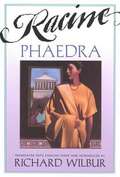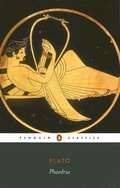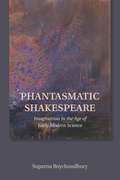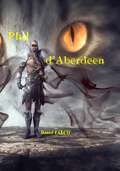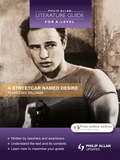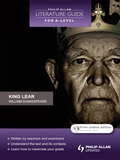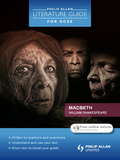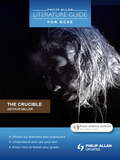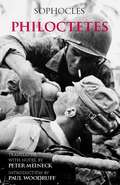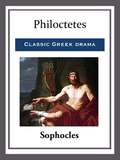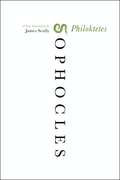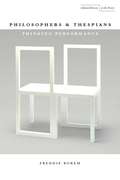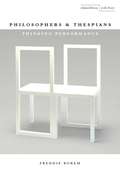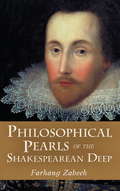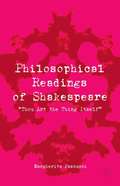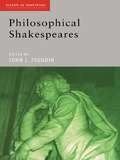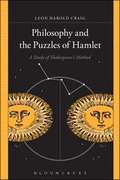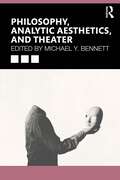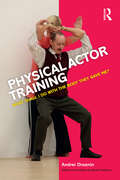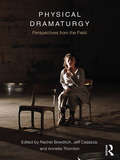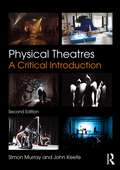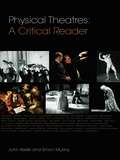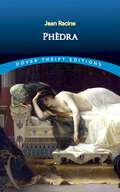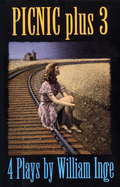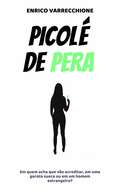- Table View
- List View
Phaedra, by Racine
by Richard WilburPhaedra is consumed with passion for Hippolytus, her stepson. Believing her husband dead, she confesses her love to him and is rebuffed. When her husband returns alive, Phaedra convinces him that it was Hippolytus who attempted to seduce her. In his interpretation, Racine replaced the stylized tragedy with human-scale characters and actions. Introduction by Richard Wilbur.
Phaedrus
by Plato Christopher RowePhaedrus is widely recognized as one of Plato's most profound and beautiful works. It takes the form of a dialogue between Socrates and Phaedrus and its ostensible subject is love, especially homoerotic love. This new translation is accompanied by an introduction, further reading, and full notes on the text and translation that discuss the structure of the dialogue and elucidate issues that might puzzle the modern reader.
Phantasmatic Shakespeare: Imagination in the Age of Early Modern Science
by Suparna RoychoudhuryRepresentations of the mind have a central place in Shakespeare’s artistic imagination, as we see in Bottom struggling to articulate his dream, Macbeth reaching for a dagger that is not there, and Prospero humbling his enemies with spectacular illusions. Phantasmatic Shakespeare examines the intersection between early modern literature and early modern understandings of the mind’s ability to perceive and imagine. Suparna Roychoudhury argues that Shakespeare’s portrayal of the imagination participates in sixteenth-century psychological discourse and reflects also how fields of anatomy, medicine, mathematics, and natural history jolted and reshaped conceptions of mentality. Although the new sciences did not displace the older psychology of phantasms, they inflected how Renaissance natural philosophers and physicians thought and wrote about the brain’s image-making faculty. The many hallucinations, illusions, and dreams scattered throughout Shakespeare’s works exploit this epistemological ferment, deriving their complexity from the ambiguities raised by early modern science.Phantasmatic Shakespeare considers aspects of imagination that were destabilized during Shakespeare’s period—its place in the brain; its legitimacy as a form of knowledge; its pathologies; its relation to matter, light, and nature—reading these in concert with canonical works such as King Lear, Macbeth, and The Tempest. Shakespeare, Roychoudhury shows, was influenced by paradigmatic epistemic shifts of his time, and he in turn demonstrated how the mysteries of cognition could be the subject of powerful art.
Phil d'Aberdeen: A play in Anglo-Saxon sauce ...
by Daniel FalcoPhil d'Aberdeen by Daniel Falco A play in Anglo-Saxon sauce ... Phil d'aberdeen Phil the Scotsman, Phil the English, Phil the hero. Three different features for the same man who embodies the fundamental values of human life, seen as the only possibility of expressing himself in small and large enterprises, in hatred and love, in truth and falsehood, in courage and fear. Daniel Falco's theater comes to life, it dialogues with the actors, with the characters, with the scenes. And it does so through a curtain.
Philip Allan Literature Guide (for A-Level): A Streetcar Named Desire
by Nicola OnyettWritten by experienced A-level examiners and teachers who know exactly what students need to succeed, and edited by a chief examiner, Philip Allan Literature Guides (for A-level) are invaluable study companions with exam-specific advice to help you to get the grade you need.This full colour guide includes:- detailed scene summaries and sections on themes, characters, form, structure, language and contexts - a dedicated 'Working with the text' section on how to write about texts for coursework and controlled assessment and how to revise for exams - Taking it further boxes on related books, film adaptations and websites - Pause for thought boxes to get you thinking more widely about the text - Task boxes to test yourself on transformation, analysis, research and comparison activities - Top 10 quotesPLUS FREE REVISION RESOURCES at www.philipallan.co.uk/literatureguidesonline, including a glossary of literary terms and concepts, revision advice, sample essays with student answers and examiners comments, interactive questions, revision podcasts, flash cards and spider diagrams, links to unmissable websites, and answers to tasks set in the guide.
Philip Allan Literature Guide (for A-Level): King Lear
by Martin OldWritten by experienced A-level examiners and teachers who know exactly what students need to succeed, and edited by a chief examiner, Philip Allan Literature Guides (for A-level) are invaluable study companions with exam-specific advice to help you to get the grade you need.This full colour guide includes:- detailed scene summaries and sections on themes, characters, form, structure, language and contexts - a dedicated 'Working with the text' section on how to write about texts for coursework and controlled assessment and how to revise for exams - Taking it further boxes on related books, film adaptations and websites - Pause for thought boxes to get you thinking more widely about the text - Task boxes to test yourself on transformation, analysis, research and comparison activities - Top 10 quotesPLUS FREE REVISION RESOURCES at www.philipallan.co.uk/literatureguidesonline, including a glossary of literary terms and concepts, revision advice, sample essays with student answers and examiners comments, interactive questions, revision podcasts, flash cards and spider diagrams, links to unmissable websites, and answers to tasks set in the guide.
Philip Allan Literature Guide (for GCSE): Macbeth
by Shelagh Hubbard Jeanette WeatherallPhilip Allan Literature Guides (for GCSE) provide exam-focused analysis of popular set texts to give students the very best chance of achieving the highest grades possible. Designed to be used throughout the course or as revision before the exam, this full colour text provides: thorough commentary outlining the plot and structure and exploring the themes, style, characters and context of the text exemplar A*- and C-grade answers to exam-style questions, with examiner's comments, exam and essay-writing advice assessment objectives for each exam board, highlighting the specific skills that students need to develop 'Grade booster' boxes with tips on how to move between grades'Pause for thought' boxes to make students consider their own opinions on the text Key quotations memorise and use in the exams Each guide comes with free access to a website with further revision aids, including interactive quizzes, a forum for students to share their ideas, useful web links plus additional exam-style questions and answers with examiner's comments and expert advice.
Philip Allan Literature Guide (for GCSE): The Crucible
by Shaun McCarthy Jeanette WeatherallFor study or revision, these guides are the perfect accompaniment to the set text, providing invaluable background and exam advice.Philip Allan Literature Guides (for GCSE) offer succinct and accessible coverage of all key aspects of the set text and are designed to challenge and develop your knowledge, encouraging you to reach your full potential.Each full colour guide:- Gives you the confidence that you know your set text inside out, with insightful coverage for you to develop your understanding of context, characters, quotations, themes and style- Ensures you are fully prepared for your exams: each guide shows you how your set text will be measured against assessment objectives of the main specification- Develops the skills you need to do well in your exams, with tasks and practice questions in the guide, and lots more completely free online, including podcasts, glossaries, sample essays and revision advice at www.philipallan.co.uk/literatureguidesonline
Philoctetes
by Sophocles Paul Woodruff Peter MeineckFirst published in Peter Meineck and Paul Woodruff's Sophocles: Four Tragedies, this riveting translation by Peter Meineck of Sophocles' Philoctetes features a new Introduction by Paul Woodruff.
Philoctetes
by SophoclesThe winner of the Festival of Dionysus in 409 BC, 'Philoctetes' describes the attempt by Neoptolemus and Odysseus to bring disabled master archer, Philoctetes, with them to Troy. The play covers several deep, contentious themes, including moral relativity, trauma, love vs. hatred, and friendship vs. enmity.
Philoktetes
by SophoclesAmong the most celebrated plays of ancient Athens, Philoketes is one of seven surviving dramas by the great Greek playwright, Sophocles, now available from Harper Perennial in a vivid and dynamic new translation by award-winning poet James Scully. A powerful tale born out of the blood and chaos of the Trojan War, Philoketes tells the story of a wounded soldier exiled by Odysseus, and the devastating consequences of the abandoned warrior’s dangerously conflicted emotions when his former commander realizes Troy will not fall without Philoktetes and attempts to recruit him once more. This is Sophocles, vibrant and alive, for a new generation.
Philosophers and Thespians
by Freddie RokemRokem (art, Tel Aviv U. ) focuses on four specific encounters between philosophers and thespians in order to explore relationships between the discursive practices of theater and philosophy. They are Plato's Symposium and the ancient quarrel between philosophy and poetry, Hamlet as philosopher and thespian, the Nietzsche-Strindberg correspondence, and Walter Benjamin and Bertold Brecht discuss Franz Kafka. In addition, he discusses accidents and catastrophic constellations in performative agendas and the performative storytelling of Walter Benjamin. Annotation c2010 Book News, Inc. , Portland, OR (booknews. com)
Philosophers and Thespians: Thinking Performance
by Freddie RokemThe interaction between philosophy and theater or performance has recently become an important and innovative area of inquiry. Philosophers and Thespians contribute to this emerging field by looking at four direct encounters between philosophers and thespians, beginning with Socrates.
Philosophical Pearls of the Shakespearean Deep
by Farhang ZabeehOffers many fresh insights that will give even longtime readers of Shakespeare a new appreciation of the great master.Scholars have long debated the extent of Shakespeare's education. Although his friend and admirer Ben Jonson said of him, "thou hadst small Latine and lesse Greek," Shakespeare's plays reveal a wide familiarity with literary and philosophical works from the Renaissance, the Middle Ages, and the classical age. Philosopher Farhang Zabeeh delves into this fascinating topic in this detailed study of the philosophical influences evident in Shakespeare's plays and sonnets. Readers will be surprised and delighted to discover in Shakespeare unmistakable echoes of Plato, Aristotle, Cicero, Dante, Montaigne, and other famous thinkers. In one chapter, the author makes a convincing case that one of the bard's most famous comic characters, John Falstaff, is a parody of Socrates. In other chapters, he demonstrates indirect references to Plato in Shakespearean passages concerning appearance versus reality, as well as the influence of Aristotle's ethics. Other common philosophical themes evident in the plays concern the nature of time, subjectivity versus objectivity, and political and moral values. This new work offers many fresh insights that will give even longtime readers of Shakespeare a new appreciation of the great master.
Philosophical Readings of Shakespeare
by Margherita PascucciThis book offers a close philosophical reading of King Lear and Timon of Athens which provides insights into the groundbreaking ontological discourse on poverty and money. Analysis of the discourse of poverty and the critique of money helps to read Shakespeare philosophically and opens new reflections on central questions of our own time.
Philosophical Shakespeares (Accents on Shakespeare)
by John J. JoughinShakespeare continues to articulate the central problems of our intellectual inheritance. The plays of a Renaissance playwright still seem to be fundamental to our understanding and experience of modernity.Key philosophical questions concerning value, meaning and justice continue to resonate in Shakespeare's work. In the course of rethinking these issues, Philosophical Shakespeares actively encourages the growing dissolution of boundaries between literature and philosophy. The approach throughout is interdisciplinary, and ranges from problem-centred readings of particular plays to more general elaborations of the significance of Shakespeare in relation to individual thinkers or philosophical traditions.
Philosophy and the Puzzles of Hamlet: A Study of Shakespeare's Method
by Leon Harold CraigShakespeare's famous play, Hamlet, has been the subject of more scholarly analysis and criticism than any other work of literature in human history. For all of its generally acknowledged virtues, however, it has also been treated as problematic in a raft of ways. In Philosophy and the Puzzles of Hamlet, Leon Craig explains that the most oft-cited problems and criticisms are actually solvable puzzles. Through a close reading of the philosophical problems presented in Hamlet, Craig attempts to provide solutions to these puzzles. The posing of puzzles, some more conspicuous, others less so, is fundamental to Shakespeare's philosophical method and purpose. That is, he has crafted his plays, and Hamlet in particular, so as to stimulate philosophical activity in the "judicious" (as distinct from the "unskillful") readers. By virtue of showing what so many critics treat as faults or flaws are actually intended to be interpretive challenges, Craig aims to raise appreciation for the overall coherence of Hamlet: that there is more logical rigor to its plot and psychological plausibility to its characterizations than is generally granted, even by its professed admirers. Philosophy and the Puzzles of Hamlet endeavors to make clear why Hamlet, as a work of reason, is far better than is generally recognized, and proves its author to be, not simply the premier poet and playwright he is already universally acknowledged to be, but a philosopher in his own right.
Philosophy, Analytic Aesthetics, and Theater
by Michael Y. BennettBringing together the latest research and perspectives in the fields of analytic philosophy and theater studies, this collection of essays provides a reflection of how these two fields have emerged and intersected in the twenty-first century.With contributions from leading scholars in the field and emerging voices, Philosophy, Analytic Aesthetics, and Theater provides new insights into the field of philosophy and theater. Structured in three parts, Part I, "Epistemology," explores perspectives on theater as a knowledge-making system, the conventions of theater, and reflects on current practice that engages with aesthetics. Part II, "Politics and Ethics," draws on an evaluation of the ways in which theater and democracy interact, as well as the current conversations around ethical issues within the performance space. And finally, Part III, "Theater and Other Arts," takes a look at the ways in which philosophy has interacted with the art of dance, musical theater, and film, looking beyond the traditional confines of actors, stage, and audience.Edited by Michael Y. Bennett, these essays introduce the latest research in philosophy and theater in an accessible and engaging manner. The book is ideal for advanced undergraduate and postgraduate students, scholars of theater and performance studies, and philosophy students and scholars with an interest in theater.
Physical Actor Training: What Shall I Do with the Body They Gave Me?
by Andrei DrozninIf, as an actor, your body is your 'instrument' - and the only way you can express the internal impulses of the character you’re playing - what happens when the body-mind, ‘psychophysical’ connection is lost? Andrei Droznin, Russia's foremost teacher of physical actor training, calls this loss the 'desomatization' of the human body, and argues that these connections urgently need to be restored for full expressivity. This is a genuinely unique book which links theory to practice by a man who has worked at the very top of Russian theatre; a movement specialist who has taught at the Moscow Art Theatre as well as drama schools all over the world. Beautifully translated by Natasha Fedorova, this volume will excite and inspire a new generation of English-language readers.
Physical Dramaturgy: Perspectives from the Field
by Rachel Bowditch Jeff Casazza Annette ThorntonWhat is physical dramaturgy? While the traditional dramaturg shares research intellectually, the physical dramaturg does so viscerally and somatically. By combining elements of text, history, dramatic structure, and the author’s intent with movement analysis and physical theatre pedagogies, the physical dramaturg gives actors the opportunity to manifest their work in a connected and intuitive manner and creates a field that is as varied and rich as the theatre itself. Physical Dramaturgy: Perspectives from the Field explores the ways in which this unique role can benefit the production team during the design and rehearsal phases of both traditional and devised productions. Individual chapters look at new ways of approaching a wealth of physical worlds, from the works of Shakespeare and other period playwrights to the processes of Jerzy Grotowski, Lloyd Williamson, Richard Schechner, and Michael Chekhov, and devising original works in a variety of contexts from Pig Iron, Dell’Arte International, Bill Bowers and mime, Tectonic Theater Project, and Liz Lerman’s Dance Exchange. This anthology gives dramaturgs, actors, and directors new ways of looking at existing methods and provides examples of how to translate, combine, and adapt them into new explorations for training, rehearsal, or research.
Physical Theatres: A Critical Introduction
by Simon Murray John KeefeThis new edition of Physical Theatres: A Critical Introduction continues to provide an unparalleled overview of non-text-based theatre, from experimental dance to traditional mime. It synthesizes the history, theory and practice of physical theatres for students and performers in what is both a core area of study and a dynamic and innovative aspect of theatrical practice. This comprehensive book: traces the roots of physical performance in classical and popular theatrical traditions looks at the Dance Theatre of DV8, Pina Bausch, Liz Aggiss and Jérôme Bel examines the contemporary practice of companies such as Théatre du Soleil, Complicite and Goat Island focuses on principles and practices in actor training, with reference to figures such as Jacques Lecoq, Lev Dodin, Philippe Gaulier, Monika Pagneux, Etienne Decroux, Anne Bogart and Joan Littlewood. Extensive cross references ensure that Physical Theatres: A Critical Introduction can be used as a standalone text or together with its companion volume, Physical Theatres: A Critical Reader, to provide an invaluable introduction to the physical in theatre and performance. New to this edition: a chapter on The Body and Technology, exploring the impact of digital technologies on the portrayal, perception and reading of the theatre body, spanning from onstage technology to virtual realities and motion capture; additional profiles of Jerzy Grotowski, Wrights and Sites, Punchdrunk and Mike Pearson; focus on circus and aerial performance, new training practices, immersive and site-specific theatres, and the latest developments in neuroscience, especially as these impact on the place and role of the spectator.
Physical Theatres: A Critical Reader
by Simon Murray John KeefePhysical Theatres: A Critical Reader is an invaluable resource for students of physically orientated theatre and performance. This book aims to trace the roots and development of physicality in theatre by combining practical experience of the field with a strong historical and theoretical underpinning. In exploring the histories, cross-overs and intersections of physical theatres, this critical Reader provides: six new, specially commissioned essays, covering each of the book’s main themes, from technical traditions to contemporary practises discussion of issues such as the foregrounding of the body, training and performance processes, and the origins of theatre in both play and human cognition a focus on the relationship and tensions between the verbal and the physical in theatre contributions from Augusto Boal, Stephen Berkoff, Étienne Decroux, Bertolt Brecht, David George, J-J. Rousseau, Ana Sanchez Colberg, Michael Chekhov, Jeff Nuttall, Jacques Lecoq, Yoshi Oida, Mike Pearson, and Aristotle.
Phèdre: Avec Commentaires Choisis Des Meilleurs Commentateurs Fran?ais Augment's De Remarques Par Otto Fiebig Et Stanislas Lep (Dover Thrift Editions: Plays Ser.)
by Jean RacineBased on Euripides' Hippolytus, this play by one of France's greatest playwrights is a magnificent example of character exposition. When the title character, Hippolytus' stepmother, receives false information that her husband, Theseus, is dead, Phèdra reveals a passionate love for her stepson — an act that eventually spells doom for both characters.
Picnic
by William IngeThis title collects four plays by American playwright William Inge, including Come Back Little Sheba, Picnic, Bus Stop, and The Dark at the Top of the Stairs.
Picolé de pera
by Enrico VarrecchioneO tão aguardado início no programa de estudos Erasmus, na Suécia, logo se revela um encontro desagradável com um universo no qual violência, sexualidade e abuso se sobrepõem. O protagonista, e também autor, narra os primeiros doze dias de estada no país escandinavo, entre a pequena cidade de Uddevalla e a grande e cosmopolita Gotemburgo, a difícil convivência com sua coinquilina, Lena, e um sentimento de inadequação que, mais tarde, culminará em uma crise pessoal e psicológica.
